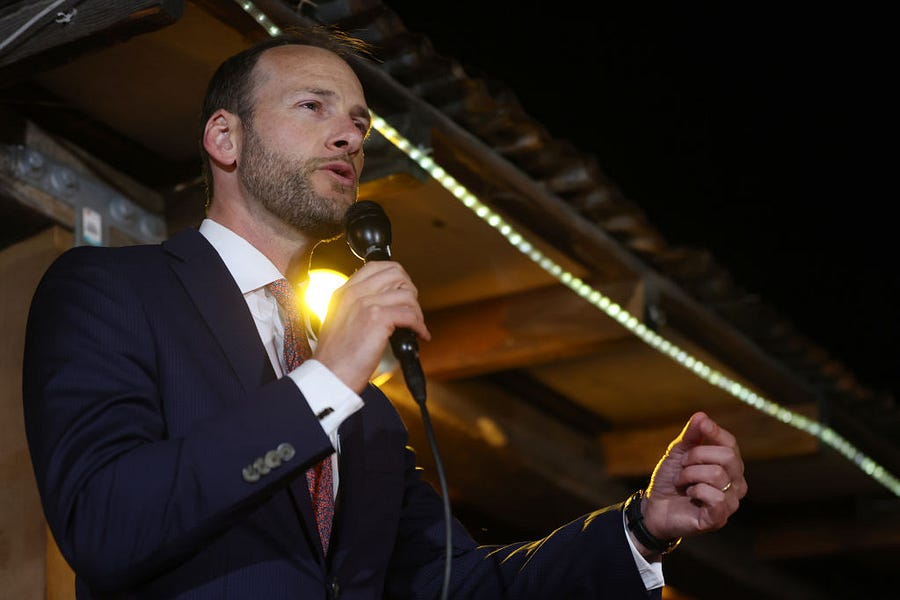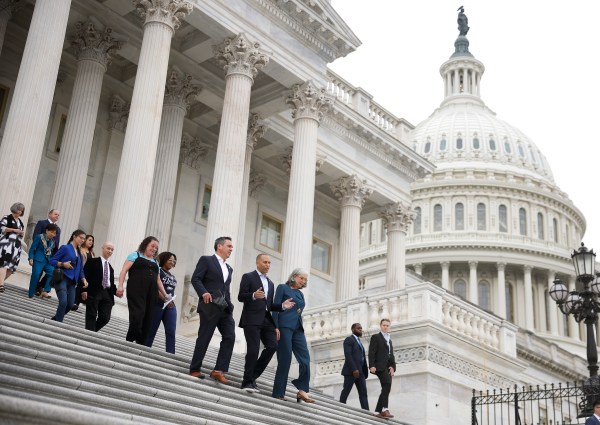Chesa Boudin’s victory in San Francisco’s 2019 district attorney’s election seemed to signal momentum for the “progressive prosecutor movement” nationwide. His unusual life story (he was a Rhodes Scholar raised by members of the Weather Underground), connections to the national criminal-justice reform movement, and an endorsement from Bernie Sanders put the race in the national spotlight. Even better for a politician running in deep-blue San Francisco, he drew criticism from then-Attorney General Bill Barr.
But just two years after assuming office, Boudin is out after being recalled Tuesday. The ballot measure calling for his recall, Proposition H, passed by 20 percent. His defeat speaks not only to a growing, well publicized backlash against the “progressive prosecutor” movement, but also to the increasingly important role Asian American voters play in urban politics.
It’s worth noting, though, that claims of a progressive shift in public opinion were probably always exaggerated. Boudin won a tightly contested election by less than 3,000 votes, and because of San Francisco’s unusual “instant runoff” elections, won with only 36 percent of first-choice votes. Boudin’s victory was not only close but also occurred in a low-turnout off year, which usually advantages progressive candidates in urban areas.
Support for criminal justice reform, then, may be shallower than opinion polls indicate. In an interview with The Dispatch, Rafael A. Mangual, a criminal-justice policy expert at the Manhattan Institute, noted that most voters tend to be in favor of criminal-justice reform in a general sense, but reject many specific policies associated with the progressive prosecutor movement. For example, in a 2016 Vox/Morning Consult opinion poll, 52 percent of voters said that they supported reducing the number of people in prison, but when asked about reducing prison sentences for violent offenders (the majority of incarcerated individuals in the American prison system) only about a third answered in the affirmative; another question that asked about reducing sentences for “crime in general” received even lower support at 24 percent.
The “[electoral] success of the progressive prosecutor movement didn’t reflect the mandate that a lot of people thought it did,” Mangual noted. After “a little bit of experience with a robust decarceration program,” voters are “rejecting it, because they would have rejected it all along,” he said.
Even in deep-blue San Francisco, voters quickly became fed up with progressive approaches to law and order. Supporters of Yes on H capitalized on the widespread sense—also well-chronicled in the national news—of declining public order in San Francisco, symbolized by open-air drug dealing in the troubled Tenderloin neighborhood, tent encampments dotted throughout the city, and omnipresent vehicle break-ins.
Boudin’s initial response, citing contested statistics about declining crime rates, only further exasperated many voters. Recognizing this, Boudin spent the last few months of the campaign attempting to restore ties to disaffected community groups, most notably San Francisco’s heavily Chinese American community, a group of voters that has assumed outsize importance in San Francisco (and California’s) politics in recent years.
Aside from homelessness and petty theft—crime issues which are present in most West Coast cities—the issue that most animated many supporters of the Boudin recall, including Chinese-American community groups, was the perception that the D.A. was insufficiently responsive to attacks on Asian-Americans in San Francisco, especially vulnerable elders, who often do not speak English and struggle to communicate with law enforcement.
For example, in October, the California Asia Pacific Bar Association authored a letter, signed by a number of other Asian American community groups, to Boudin demanding that his office improve the interpretative services it offered to victims’ families, citing the case of an elderly Thai murder victim whose family was unable to access a translator for weeks. Two of the recall campaign's most prominent endorsements came from the Edwin M. Lee Asian Pacific Democratic Club and the Chinese American Democratic Club.
But outside of establishment voter clubs, the grassroots anger among many Asian American residents was palpable. David Lee, the executive director of San Francisco’s Chinese American Voter Education Committee, noted in an interview with The Dispatch that at many of the pro-recall rallies on the west side of San Francisco, large numbers of the attendees were Asian American, including many immigrants and new voters.
The prominence of Asian Americans in the recall campaign, especially in its later stages, mirrored another San Francisco recall election that made national political waves. This was February’s ouster of three SFUSD school board members, recalled after months of school shutdowns, a well-publicized attempt to change the names of schools named after the Founding Fathers, one notorious incident where the president of the board referred to Asian Americans unenthusiastic about critical race theory as “House N****’s” in a tweet, and the elimination of entrance standards at the city’s famous public magnet high school, Lowell.
This last incident was the proverbial straw that broke the camel’s back for many voters, and, as Lee noted in the interview, Asian Americans were instrumental to that first recall campaign. Galvanized by the elimination of entrance requirements to Lowell, long seen as a symbol of Asian American achievement, “the Chinese community led the effort to gather signatures. … They took on the Democratic establishment and won,” Lee said. “That really shook up the political world of San Francisco.”
The prominence of San Francisco’s Asian American community in the Boudin recall, which was successful in most neighborhoods of San Francisco but racked up some of its biggest wins in the strongly Chinese Sunset, Outer Richmond, and Chinatown neighborhoods, is indicative of broader state and national trends. In California’s own political context, the recall of half the school board, then of Boudin comes after voters rejected reinstating affirmative action for state university admissions in 2020—all issues which took on a particular resonance for Asian-American immigrant groups.
In a nationwide context, Boudin’s recall is yet another sign of a growing rift between the Democratic Party’s progressive wing and Asian immigrant groups, especially on issues related to education and crime. In the field of education, Virginia’s prestigious Thomas Jefferson high school, a public magnet school much like Lowell, attempted to change its admissions requirements to increase racial diversity—it was met with a protest campaign prominently featuring South Asian families and an ongoing civil rights lawsuit, and was widely seen as a contributing factor in Republican Governor Glenn Youngkin’s surprise victory. In the last year of his mayoralty, New York City’s Bill de Blasio sought to change the entrance requirements for New York’s own system of selective public high schools, a move greeted with vociferous opposition from Asian American groups.
In the criminal justice sphere, Boudin’s defeat will undoubtedly lead to increased scrutiny of the other paragons of the progressive prosecutor movement: Philadelphia’s Larry Krasner and New York’s Alvin Bragg. Bragg, in particular, has made moves to address a surge in hate crimes against Asian Americans, who remain worried about their safety. A 2022 Pew survey found that a third of respondents had changed their daily routines out of a fear of increasing attacks against Asian Americans, facts that most likely contributed to Boudin’s defeat in San Francisco and the over-performance of Republican mayoral candidate Curtis Sliwa in Asian neighborhoods of New York City.
For progressives and Democrats already worried about a looming midterm wipeout in November, Boudin’s defeat is a warning signal on multiple levels. It is not only a sign that public support for criminal justice reform may be far weaker than originally thought—it is hard to imagine an electorate more sympathetic to Boudin’s ideology than San Francisco’s—but that the movement of minority voters away from progressives, if not necessarily Democrats, is hardly a passing trend.
James Sutton is a former Dispatch intern.







Please note that we at The Dispatch hold ourselves, our work, and our commenters to a higher standard than other places on the internet. We welcome comments that foster genuine debate or discussion—including comments critical of us or our work—but responses that include ad hominem attacks on fellow Dispatch members or are intended to stoke fear and anger may be moderated.
With your membership, you only have the ability to comment on The Morning Dispatch articles. Consider upgrading to join the conversation everywhere.